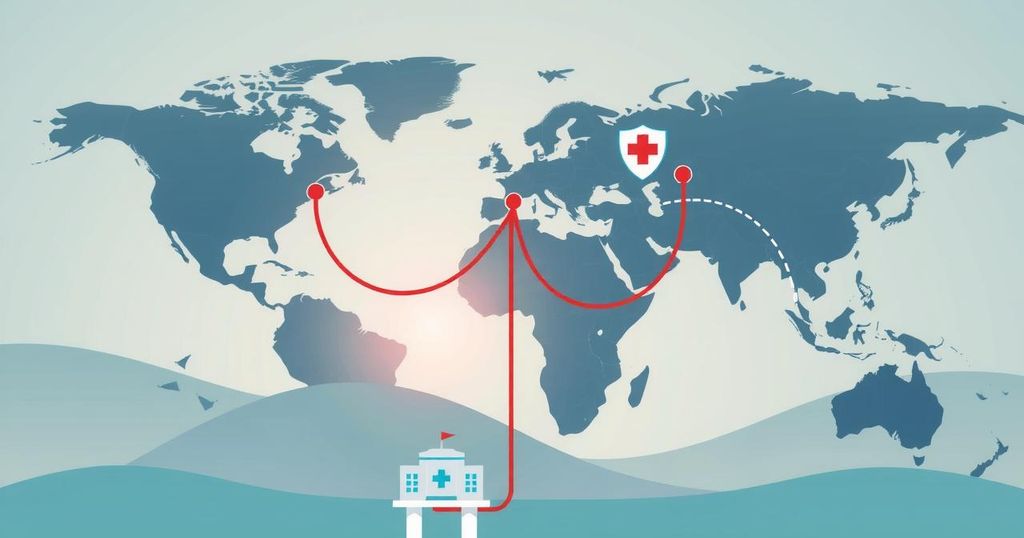Russian soldiers like Aleksei are being sent to North Korea for rehabilitation after injuries sustained in Ukraine. Aleksei’s experience at a Wonsan sanatorium included recreational activities but lack of expected medical treatment. Increasing cooperation between Russia and North Korea is evident, with confirmations of hundreds of Russian soldiers receiving medical care in North Korea, despite potential barriers in healthcare services.
After two years on the frontlines in Ukraine, Aleksei, a Russian soldier, returned to Vladivostok in summer 2022 to recover from a leg wound. Seeking a state-funded medical retreat at a sanatorium, he was told that popular locations were fully booked, and instead was sent to a facility in North Korea’s Wonsan after a brief flight to Pyongyang. Although unanticipated, Aleksei decided to proceed with the trip.
Aleksei was one of many Russian soldiers reportedly sent covertly to North Korea for rehabilitation, reflecting increasing military collaboration between Russia and North Korea since the war began. During his week-long stay, he shared the Wonsan facility with around two dozen other Russian servicemen, enjoying limited recreational activities despite lacking adequate medical care and decent food.
The conditions at the sanatorium were described as generally clean, with amenities like a pool and sauna; however, Aleksei noted that the meals provided were unappetizing and deficient in meat. Restrictions also limited interaction with locals and evening outings, affecting the soldiers’ overall experience.
Despite the publicity around these trips being sparse, Russia’s ambassador to North Korea confirmed the rehabilitation of “hundreds of Russian soldiers” in North Korean facilities, stating their stay was free of charge. This acknowledgment marked a significant recognition of North Korea’s supportive role in the context of the war.
The extent of North Korea’s medical support for Russian troops is still unclear, particularly due to potential language barriers and resource constraints within its healthcare system. Moreover, it remains uncertain whether severely wounded soldiers have been treated at North Korean hospitals beyond Wonsan.
Reportedly, the rehabilitation outreach appears limited, primarily targeting servicemen from Russia’s far east due to proximity to North Korea, with a few hundred participants per trip facilitated by a Russian tour agency. North Korea, however, has been noted to have the capacity to accommodate many more soldiers.
Plans for a luxury resort on the Kalma Peninsula could further enhance the appeal of North Korea as a destination for Russian medical and potential military engagement. Observations have been raised regarding the possibility that these trips might serve as cover for military collaboration between the two nations, fostering exchanges of tactical knowledge.
Additionally, North Korea has organized summer camps for children of Russian soldiers who died in Ukraine, underscoring the personal connections formed through this military alliance. Experiences at such camps have been covered more openly than the medical excursions, highlighting a stark contrast in media portrayal.
Aleksei expressed reluctance about returning to North Korea for future recovery trips, preferring to recuperate in a more familiar environment. His account illustrates the complexities and challenges faced by Russian soldiers during their rehabilitation amid a broader geopolitical context.
The article indicates a shift in the dynamics between Russia and North Korea, wherein North Korea is stepping in to offer medical support to wounded Russian soldiers. Despite the initial positive impressions regarding facilities, the lack of adequate medical care and food quality raises concerns about the well-being of these soldiers. The collaboration further symbolizes the strengthening of ties between the two nations amidst ongoing conflicts. It elucidates a larger narrative involving shared resources and military strategies in light of the war in Ukraine.
Original Source: www.theguardian.com






